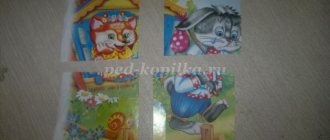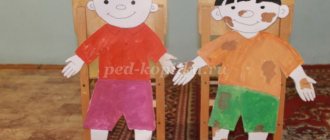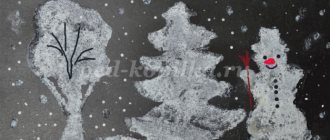Card index of conversations on the formation of a healthy lifestyle in children of primary preschool age
1. "Learning about your body"
Learn to name the sense organs; talk about their role in the body and how to take care of them;
Learn to distinguish smells and tastes;
Fix the colors (blue, red, yellow, green).
Reinforce the concept of “many”, “one”;
Develop speech, memory, attention;
Cultivate a friendly and sensitive attitude towards each other, teach a culture of behavior.
2. “Long live scented soap”
Introduce children to the properties of soap and its varieties;
To consolidate and clarify children's knowledge of why people use soap in everyday life;
Bring children to the concept that “Cleanliness is the key to health”;
Develop cultural and hygienic skills.
3. “Eyes are a person’s main assistants”
Form an idea of the need to take care of your eyes (you need to wash your face properly, dry only with a clean towel; you cannot rub them with dirty hands, throw sand in your eyes, etc.)
4. “So that ears can hear”
To form an idea of the organ of hearing - the ears; the importance of the hearing organ for humans. To form an idea of the need to care for the ears, as well as a careful attitude towards the health of the ears.
5. "My Skin"
Examining the skin on your hands through a magnifying glass. A teacher's story about the importance of skin for a person. Strengthen cultural and hygienic skills of hand washing. Cultivate curiosity about your body.
6. “Have mercy on your skin.”
To form children’s ideas about skin care, talk about hardening. Foster the need for a healthy lifestyle.
7. “Clean hands”
Teach children how to prevent infectious diseases.
8. “Health Rules 1, 2”
repeat K. Chukovsky’s work “Moidodyr”;
bring children to understand that cleanliness is the key to health;
encourage them to independently perform basic hygiene skills: wash their hands, face, body.
9. Conversation on the topic
: “How to wash your hands correctly” Goal: to improve the Ph.D., improve the simplest skills of behavior while washing.
10.
Conversation
on the topic “Sit correctly at the table” Goal: developing basic table behavior skills.
11.
Conversation
on the topic “Magic words” Goal: to develop politeness in children
(thank you for help, say goodbye and hello)
12.
Conversation on the topic “I am good”
Goal: to form basic ideas about what is good and what is bad.
13.
Conversation on the topic
: “Parts of the day. What we do in the morning, afternoon, evening, night” Goal: developing the ability to name the parts of the day.
14.
Conversation
on the topic “Dangerous things” Purpose: getting to know the sources of danger at home.
15.
Conversation on the topic “Our clothes”
. Objectives: To teach children to understand general words: clothes, hats. Clarify the names and purposes of items, features of their use.
16. Conversation on the topic
“Clothing, hats”
.
Objectives: To consolidate children's understanding of general words
, to teach them to distinguish and name the qualitative characteristics of hats and clothing
(color, shape, size)
.
17.
Conversation “Behavior at the table”
. Objectives: To develop cultural and hygienic skills in children, continue to familiarize them with table manners, and teach them to apply them in practice. Learn to use a napkin and hold a spoon correctly.
18.
Conversation on the topic “Clean hands”
. Objectives: Tell children why it is important to wash your hands thoroughly after a walk, going to the toilet, and before eating. Offer to show how to wash your hands correctly.
19.
Conversation on the topic “Me and my health
. Objectives: Tell children that health is one of the main values of life. Form basic ideas about how to take care of your health.
20.
Conversation on the topic “Don’t jump from high objects”
Objectives: To form basic ideas about how to take care of your health.
21.
Conversation with children on the topic “Vegetables”
. Goal: expand the understanding of the benefits of vegetables, enrich the vocabulary with verbs and adjectives.
22. Conversation
“Help Bunny preserve his health”
Goal: To develop children’s initial life and health skills. Based on situational moments, learn to draw conclusions about life safety. Foster a sense of mutual assistance and a desire to help each other.
23. “Who needs what”
Goal: to consolidate children’s knowledge of the items necessary for work as a doctor, cook, or salesperson.
24. «
Fruits are good for adults and children."
Goal: To clarify children’s knowledge about healthy foods, to tell about the benefits of fruits for human health.
25.
Conversation
“Cleanliness and Health”
Goal: To develop in children an understanding of the importance and necessity of hygiene procedures.
26.
“Tanya caught a cold”, “Let’s give the dolls different hairstyles”, “We’ll wash the doll”
Goal: to promote the development of the skill of using a handkerchief, to consolidate hair care skills, and knowledge of personal hygiene items. Promote the formation of habits of neatness.
27.
Conversation
“My body”
Goal: To introduce children to the parts of the body and talk about the senses.
28. Conversation
"Vitamins and health"
Purpose: To talk about the benefits of vitamins and their importance for human health.
29. «
All kids need to know how to walk down the street.”
Goal: To introduce children to the basic rules of behavior on the street, traffic rules, and tell them about traffic lights.
30.
“My health is fine, thanks to the exercise.”
Goal: To promote the formation of the foundations of a healthy lifestyle, the need to engage in physical education and sports. Fix the name of some sports.
31.
“Doctors are our assistants.”
Goal: Continue to instill in children an understanding of the value of health, the need to be healthy, consolidate knowledge about vitamins, clarify ideas about vegetables, teach how to plant onions
MAGAZINE Preschooler.RF
Summary of an open lesson in junior group 2 Topic: “I take care of my health”Teacher of the 1st category. Lyamkina. HE.
Goal: Formation of healthy lifestyle skills, development of children’s speech and motor activity.
Educational objectives: to cultivate in children cultural and hygienic skills, the desire to always be beautiful, clean, neat, and respect their body.
Developmental tasks: to arouse interest in performing cultural and hygienic skills, to encourage children to constantly observe them; develop observation and curiosity.
Previous work: 1. Conversation “What is harmful, what is good for health” 2. Examination of illustrations depicting parts of the human body. 3. Didactic game “Let’s teach the Incompetent to wash his hands . 4. Reading fiction. 5. Conversations about cultural and hygienic skills. 6. Drawing. 7. Games.
-Guys, when you come to kindergarten in the morning, what is the first word that comes out of your mouth? (mouth is an old word mouth) (Hello)
Bear:
Educator:
— Guys, saying hello means wishing each other health.
mood!
Bear:
— Guys, what does it mean to be healthy and what needs to be done in order to be healthy?
Which? (Children's answers). Show picture.
Educator:
Educator:
— Guys, where does our day begin in kindergarten? (With charging)
Let's do some physical exercise.
- What do we do after charging? (we're going to wash our hands)
- children demonstrate and imitate hand washing.
Water, water, wash our face. So that the eyes sparkle, So that the cheeks turn red, So that the mouth laughs, So that the tooth bites.
Ay, okay, okay, okay, we are not afraid of water,
We wash ourselves clean and smile at Mom.
- Why did we wash our hands? (to sit at the table)
— What is the name of taking food in the morning? (breakfast)
— How should you sit at the table? (legs fit the back evenly)
Let's do an exercise for the back. (put the book on your head and walk in a circle keeping your back straight).
What do we do after breakfast? (let's go play)
A game. “Edible is not edible .
Goal: to form and consolidate children’s knowledge about vegetables and fruits and berries.
Material: ball.
- Guys, guess the riddle.
Two brothers live across the street, but don’t see each other.
- That's right, those are the eyes. In order for your eyes to see well, you need to do eye exercises.
“Gymnastics for the eyes” in verse
- **
“Your eyes need a rest.” (Guys close their eyes)
"You need to take a deep breath." (Deep breath. Eyes still closed)
“The eyes will run around.” (Eyes are open. Movement of the pupil in a circle clockwise and counterclockwise)
“They will blink many, many times” (Frequent blinking of the eyes)
“My eyes felt good.” (Lightly touch closed eyes with fingertips)
“Everyone will see my eyes!” (Eyes wide open. Wide smile on face)
- I'll start and you will continue. They love work and do not tolerate boredom
Ours can do everything... (hands)
- Now guess another riddle.
Five brothers, and each one is welcome,
It's a pity that there is only one nameless brother. (fingers).
- Now he will perform finger gymnastics for those who wish.
Girls and boys! Let's count our fingers! (Alternately extend your fingers, starting with the thumb. Move your fingers. Alternately, make a fist with your fingers, starting with the little finger.)
The first one, plump, is big,
The index is the second.
The third finger is just the middle one, it has two adjacent ones.
And the fourth one is nameless: that’s what they called him strangely.
The fifth boy is very small - and he has become a little finger.
Each finger was counted and named!
But in order to always be cheerful and cheerful, you need to live together.
Game: “Don’t you dare argue”
Educator. - This is what a strong friendship we have, we are true friends and our friendship helps us in everything.
| Next > |



